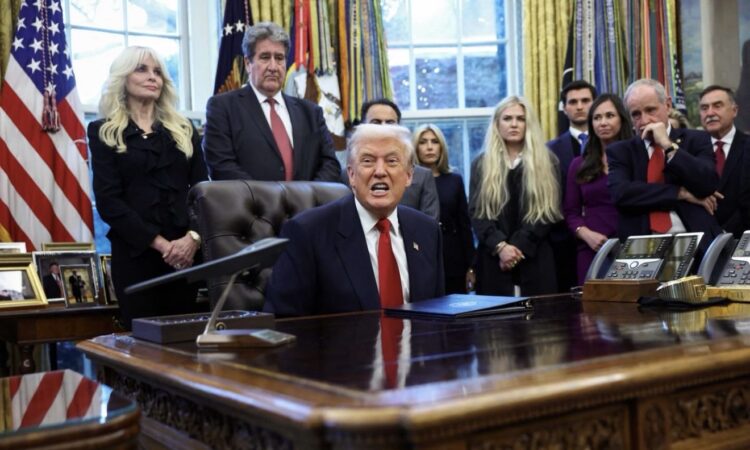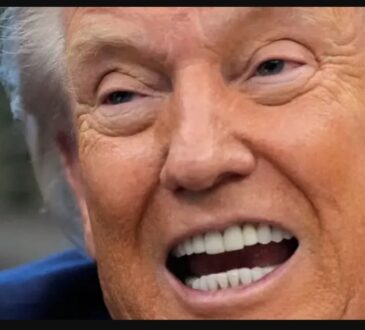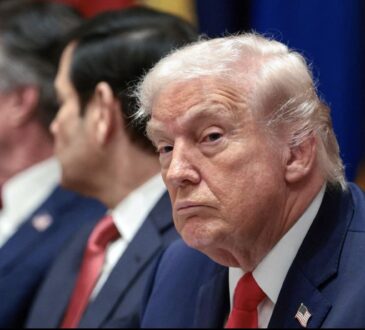
Many people across the country are becoming increasingly alarmed about how President Donald Trump is using his power in his second term. What began as ordinary political disagreement has grown into a much bigger concern. Critics say he is governing with anger, fear, and a desire to strike back at anyone who challenges him. They believe he is shaping the country in a way that reflects his own personality—divisive, combative, and driven by personal grudges rather than national interest.
People who have followed his actions closely say that instead of building strong institutions, he is tearing them down. Instead of bringing Americans together, he is widening existing divisions. They accuse him of focusing not on service or improvement, but on punishment. According to them, he seems to go out of his way to target vulnerable groups, weaken systems that protect ordinary people, and question long-standing alliances that helped keep the country stable.
Some observers believe that Trump behaves this way because he craves constant admiration. When he feels criticized or ignored, he reacts aggressively. He uses the power of the presidency not to reassure the nation, but to intimidate people into obedience. They say he wants Americans to understand one message: respect him, or face consequences. This approach has created a deeper sense of unease, even among people who previously supported him but hoped for a calmer second term.
The situation intensified when six military veterans now serving in Congress released a ninety-second video urging U.S. service members to follow one of the most important rules of the military: they must refuse illegal orders. The video reminded troops that their loyalty is to the Constitution, not to a president. It emphasized that if any leader tries to use the armed forces for personal or political gain, service members have a legal duty to reject such commands.
Trump reacted almost immediately. He posted messages online accusing the lawmakers of “sedition punishable by death.” In another post he shared, someone wrote that George Washington would have hanged them. Many saw these statements not only as dangerous, but as confirming their deepest fears—that Trump is willing to use violent language against critics, even elected officials and war veterans. The lawmakers’ warning, which had seemed like a precaution, suddenly felt urgent.
Some political analysts said they had seen this moment coming long before the latest incident. Even before Trump returned to office, they warned that he might eventually try to use the military to protect himself rather than the country. They noted that Trump has shown admiration for authoritarian leaders around the world and often expressed frustration with the limits placed on American presidents by the Constitution. According to these analysts, Trump sees checks and balances not as safeguards, but as obstacles.
There are growing concerns inside the military as well. In previous discussions, Pentagon officials explained that while troops are legally required to reject unlawful orders, the real crisis begins after they do. Would senior leaders resign in protest, or would they stay and try to protect their teams from inside the system? Nobody wants to imagine U.S. military leaders caught between obeying the Constitution and confronting a president who demands personal loyalty.
The lawmakers who made the video have strong backgrounds in national security. Senator Elissa Slotkin served with the CIA and in Iraq. She was joined by other veterans and public servants who have firsthand experience in military service. They say they created the video because Trump has been using military bases as props for his political speeches. He has publicly criticized political opponents in front of active-duty troops and encouraged them to see American cities as “training grounds.” He has insulted respected veterans like John McCain and disrespected Arlington National Cemetery during official visits. To them, these are signs that Trump views the military not as defenders of the nation, but as tools to advance his own ambitions.
Their concern has only grown as Trump’s administration faces struggles in nearly every area—economy, foreign policy, domestic stability, and public trust. When leaders begin to feel cornered, the risk of unpredictable or extreme decisions increases. Critics believe Trump may try to shift blame for his failures onto innocent people or use government power to settle personal scores. They fear he may even attempt to physically endanger political opponents if he sees it as a path to maintaining control.
People who once hoped Trump might moderate his behavior now worry that he has become even more unpredictable. They warn that he seems determined to use every institution—including the military—to serve himself, not the country. The belief among many observers is that Trump is now willing to cross lines no modern president has crossed.
The message from those raising the alarm is consistent and serious. Americans must remain alert. They must recognize when political behavior violates democratic norms and be willing to speak up. The military must never be used as a personal shield for any leader. And the public must refuse to accept dangerous behavior as normal, no matter how often it happens.
The lawmakers and analysts behind these warnings say this is not a matter of politics or party. It is about the survival of the country’s democratic values. They argue that Trump’s actions show a clear willingness to put his own interests above national stability, and that citizens have a responsibility to resist any attempt to twist democratic institutions into personal weapons.
Their final message is simple but urgent: the country cannot afford to look away or grow tired. Democracy only survives when people remain watchful, especially when a leader begins to believe he is above the law.




